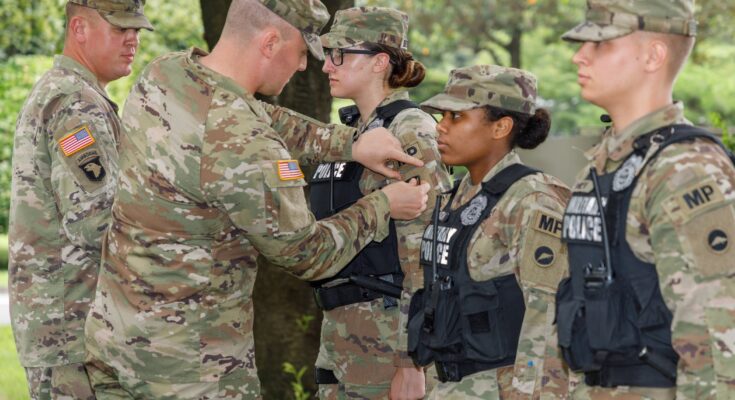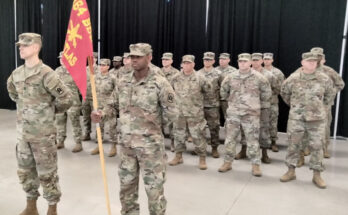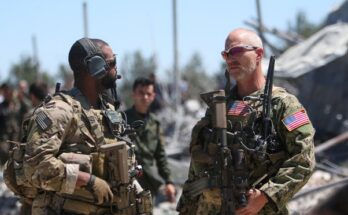United States Military Police Corps Recruitment: The United States Military Police Corps is an esteemed branch of the military, dedicated to maintaining order and discipline within the ranks and ensuring the safety of military installations.
With a history that traces back to the Revolutionary War, the Military Police Corps stands as a testament to the values of integrity, service, and excellence.
In this article, we delve deep into the recruitment programs that this esteemed institution offers, laying bare the pathways to becoming a member of this elite force.
Overview of United States Military Police Corps Recruitment Programs
The United States Military Police Corps, a pivotal segment of our nation’s defense, consistently seeks qualified individuals to maintain law, order, and discipline within the military ranks. For those considering a challenging yet rewarding career, here’s a basic overview of the recruitment programs:
Basic Requirements for Eligibility:
Before embarking on the journey to serve as a member of the Military Police Corps, it’s essential to familiarize yourself with the fundamental criteria. To ensure the highest standards are maintained:
- Age Limitations: Typically, candidates should be between the ages of 17 to 35. However, age waivers might be available in certain situations.
- Education: A minimum of a high school diploma or a GED is mandatory. Some specific roles may require higher educational qualifications.
- Citizenship: Being a U.S. citizen or a permanent resident is a prerequisite.
- Physical Fitness: Candidates must pass the Army Physical Fitness Test (APFT) to ensure they meet the physical demands of the role.
- Background Check: A clean criminal record is essential, with particular attention to felonies and serious misdemeanors.
- Medical Evaluation: A comprehensive medical examination will be conducted to ensure the candidate is fit for duty.
Application Process and Initial Screening:
Once you’ve determined your eligibility, the application process unfolds in the following manner:
- Initial Consultation: Start by contacting a local recruiter who will provide insights into the Military Police Corps and answer any preliminary queries.
- Application Submission: Fill out the required forms and provide necessary documentation such as birth certificate, Social Security card, and educational credentials.
- ASVAB Test: All applicants will undergo the Armed Services Vocational Aptitude Battery (ASVAB) test, which gauges aptitude in various fields, determining suitability for specific roles.
- Medical Examination: Conducted at a Military Entrance Processing Station (MEPS), this ensures the applicant is medically fit for military service.
- Job Selection: Based on the ASVAB scores and medical examination results, candidates will be presented with a list of Military Occupational Specialties (MOS) they qualify for.
- Oath of Enlistment: Successful candidates will then take the Oath of Enlistment, symbolizing their commitment to serve.
For individuals considering a role where they can make a tangible difference and uphold the values of honor, discipline, and integrity, the United States Military Police Corps beckons. This overview serves as a basic roadmap, but always consider discussing with a recruiter for a deeper understanding and personalized guidance.
Training and Education Programs for Military Police Corps
For those considering a role in the Military Police Corps, comprehensive training and continuous education are pivotal aspects that ensure individuals are equipped with the knowledge and skills required for their demanding roles. Here’s a closer look at these programs:
1. Basic Combat Training (BCT) and Advanced Individual Training (AIT)
- BCT: Every soldier begins their journey with Basic Combat Training, an intense 10-week program designed to instill foundational military skills, discipline, and physical endurance.
- AIT: Following BCT, individuals aiming to join the Military Police Corps undergo Advanced Individual Training. This specialized phase hones in on the nuances of military law enforcement, from crime scene management to crowd control.
2. Specialized Courses and Continued Education Opportunities
- Beyond initial training, the Military Police Corps offers numerous specialized courses to develop expertise in specific areas, such as investigative techniques, K-9 handling, and anti-terrorism tactics.
- For those eager to continue their academic pursuits, the Corps supports and often funds continued education opportunities, allowing personnel to acquire advanced degrees and further their careers.
3. The Significance of Training in Ensuring Operational Effectiveness
- Proper training is the backbone of the Military Police Corps. With the diverse challenges they face, from maintaining base security to assisting in global peacekeeping missions, robust training ensures every member is prepared to respond with professionalism and effectiveness.
- As the threats and challenges evolve, so does the training, reflecting the Corps’ commitment to staying ahead and ensuring the safety of both its personnel and the broader military community.
In essence, the Military Police Corps places significant emphasis on continuous learning and skill development, ensuring its members remain at the forefront of military law enforcement expertise.
Benefits of Joining the United States Military Police Corps
The United States Military Police Corps offers a diverse range of opportunities for those who seek to serve their nation while building a strong foundation for their future. Here’s a glimpse into some of the most compelling benefits:
1. Career Growth and Opportunities:
Joining the Military Police Corps opens the door to a world of professional advancement. Whether you’re keen on investigative roles, security details, or leading a team, there’s a path for you. With consistent training and on-the-job experiences, the Corps ensures that its members are well-prepared to tackle various challenges, providing an edge in both military and civilian job markets.
Educational Benefits and Scholarships:
Education is a cornerstone of personal and professional growth. Recognizing this, the Military Police Corps, in conjunction with the wider U.S. military structure, offers a plethora of educational benefits. This includes the GI Bill, which can cover tuition costs for members pursuing higher education. Additionally, numerous scholarships are available exclusively to military members, further easing the financial burden of schooling.
Health and Retirement Benefits:
Health and long-term security are paramount for any career choice. The Military Police Corps provides comprehensive health coverage for its members, ensuring that you and your family are taken care of. Furthermore, the military’s retirement benefits are among the most competitive, guaranteeing a secure future after years of dedicated service.
However, choosing a career with the United States Military Police Corps not only signifies a commitment to uphold law and order but also ensures a pathway filled with personal and professional growth, education, and security. Join the ranks, serve with pride, and enjoy the myriad benefits that come with it.
Outreach and Awareness Initiatives of United States Military Police Corps
To achieve this, they’ve put in place strategic outreach and awareness programs that not only showcase the unique opportunities within the Corps but also build stronger connections with the community at large.
Collaboration with Educational Institutions and Community Organizations
To bridge the gap between the Corps and potential recruits, collaboration with educational institutions and community organizations has been pivotal. Such partnerships involve:
- Guest Lectures and Workshops: By sending experienced Military Police officers to schools, colleges, and universities, students get a firsthand account of life in the Corps, the roles they play, and the impact they have.
- Career Fairs: The Corps actively participates in career fairs across the country, providing information on recruitment processes, career progression, and benefits of joining.
- Community Engagements: Partnering with community organizations helps in spreading the word at a grassroots level, ensuring that a diverse group of potential candidates becomes aware of the opportunities within the Corps.
The Role of Digital Platforms and Social Media in Reaching Potential Recruits
In today’s digital age, the power of online platforms cannot be underestimated. Recognizing this, the Military Police Corps has:
- Engaging Social Media Campaigns: With platforms like Facebook, Instagram, and Twitter, they share stories of real-life officers, provide insights into training, and highlight the camaraderie within the Corps.
- Interactive Websites: A user-friendly website acts as a hub for all recruitment-related information. Potential recruits can find detailed insights, testimonials, and even apply online.
- Virtual Tours and Webinars: Given the limitations of physical interactions in recent times, the Corps has leaned into virtual tours of their facilities and webinars, ensuring potential candidates get a feel for what awaits them.
However, the United States Military Police Corps understands the importance of effective outreach and is continually evolving its strategies to connect with potential recruits. Through a blend of traditional community engagement and modern digital outreach, they ensure a bright future with dedicated and well-informed candidates.
Challenges in Recruitment and Retention
As with many military branches, the Military Police Corps faces its own set of challenges when it comes to recruiting and retaining personnel.
1. Common Misconceptions about the Military Police Corps
- Role Clarification: Many believe that the Military Police solely handles minor disciplinary issues within the military. In reality, their duties are multifaceted, encompassing crime investigation, security operations, and combat support.
- Rigidity of the Job: Another misconception is the perceived rigidity and monotony of the role. While discipline is a cornerstone, the Military Police offers a variety of assignments and specializations, from canine units to forensic labs.
2. Addressing the Concerns of Potential Recruits and Their Families
- Safety Concerns: A career in the military, regardless of the branch, often comes with inherent risks. Addressing these concerns openly, and highlighting the extensive training and precautions in place, can assuage some fears.
- Long-Term Commitment: Many are wary of the long-term commitment associated with a military career. It’s essential to showcase the career progression, opportunities for further education, and the life skills that one can acquire during their tenure.
- Family Life: Balancing military duties with family life is a common concern. Highlighting support systems, family benefits, and community engagement can provide reassurance.
Open dialogue, transparency, and effective communication are key to addressing these challenges. By demystifying the role of the Military Police Corps and underscoring the potential benefits, the Corps can continue to attract and retain dedicated individuals who are eager to serve their nation.
Future Prospects and Innovations in Recruitment by United States Military Police Corps
The United States Military Police Corps, as with all branches of the military, has a rich history and tradition of service to the nation. As society and technology continue to evolve, so do the methods and strategies employed by the Corps to attract the best and brightest individuals.
1. Adapting to changing demographics and societal values:
In recent years, the U.S. has witnessed significant shifts in societal values, perceptions, and demographics. Recognizing these changes, the Military Police Corps is making concerted efforts to be more inclusive and diversified. Whether it’s acknowledging and respecting the cultural nuances of potential recruits or implementing gender-neutral physical fitness standards, the Corps is constantly evolving to ensure it remains reflective of the society it serves.
2. The role of technology in streamlining the recruitment process:
The digital age has transformed the way the Military Police Corps interacts with potential recruits. Leveraging state-of-the-art technologies, the Corps is now able to:
- Digital Screening: Use AI-driven tools to swiftly and accurately screen vast numbers of applicants, ensuring that only the most suitable candidates are shortlisted.
- Virtual Reality (VR) Boot Camps: By introducing VR experiences, potential recruits can get a taste of what life in the Corps might be like. This not only intrigues and excites the youth but also helps them make informed decisions.
- Enhanced Social Media Presence: Recognizing the power of platforms like Instagram, TikTok, and Facebook, the Corps has increased its digital footprint. Through engaging content, storytelling, and interactive sessions, they are reaching out to a younger, tech-savvy audience, sparking their interest in a career in the Military Police.
By embracing change and innovation, the United States Military Police Corps is not just future-proofing its recruitment strategies but is also ensuring that it remains a premier choice for those who aspire to serve the nation with honor, integrity, and commitment.
Conclusion
For those seeking a career that offers challenge, purpose, and the chance to make a meaningful difference, the Military Police Corps stands out as a compelling choice.
Beyond the honor of serving one’s country, members of the Corps gain access to unparalleled training, diverse career paths, and the chance to be part of a storied tradition of excellence.
Potential candidates are encouraged to delve deeper, ask questions, and discover the multitude of opportunities waiting within the esteemed ranks of the United States Military Police Corps. Your journey of service, leadership, and personal growth begins here.



